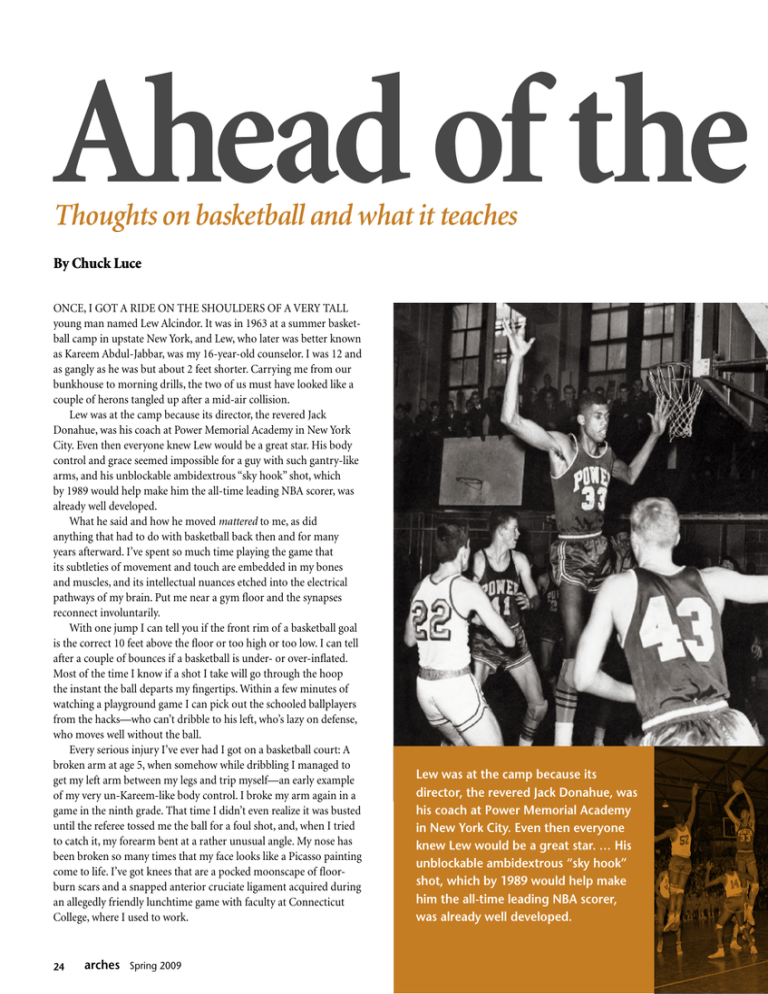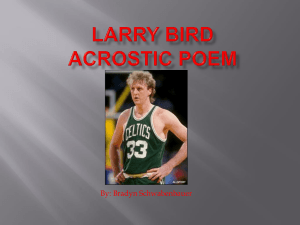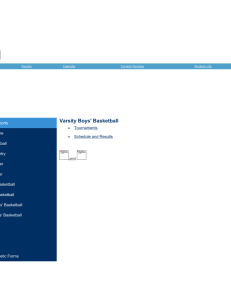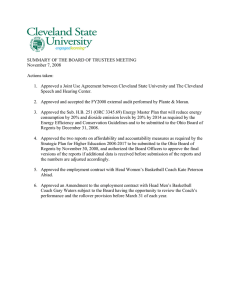Ahead of the game Thoughts on basketball and what it teaches
advertisement

Ahead of the Thoughts on basketball and what it teaches By Chuck Luce Once, I got a ride on the shoulders of a very tall young man named Lew Alcindor. It was in 1963 at a summer basketball camp in upstate New York, and Lew, who later was better known as Kareem Abdul-Jabbar, was my 16-year-old counselor. I was 12 and as gangly as he was but about 2 feet shorter. Carrying me from our bunkhouse to morning drills, the two of us must have looked like a couple of herons tangled up after a mid-air collision. Lew was at the camp because its director, the revered Jack Donahue, was his coach at Power Memorial Academy in New York City. Even then everyone knew Lew would be a great star. His body control and grace seemed impossible for a guy with such gantry-like arms, and his unblockable ambidextrous “sky hook” shot, which by 1989 would help make him the all-time leading NBA scorer, was already well developed. What he said and how he moved mattered to me, as did anything that had to do with basketball back then and for many years afterward. I’ve spent so much time playing the game that its subtleties of movement and touch are embedded in my bones and muscles, and its intellectual nuances etched into the electrical pathways of my brain. Put me near a gym floor and the synapses reconnect involuntarily. With one jump I can tell you if the front rim of a basketball goal is the correct 10 feet above the floor or too high or too low. I can tell after a couple of bounces if a basketball is under- or over-inflated. Most of the time I know if a shot I take will go through the hoop the instant the ball departs my fingertips. Within a few minutes of watching a playground game I can pick out the schooled ballplayers from the hacks—who can’t dribble to his left, who’s lazy on defense, who moves well without the ball. Every serious injury I’ve ever had I got on a basketball court: A broken arm at age 5, when somehow while dribbling I managed to get my left arm between my legs and trip myself—an early example of my very un-Kareem-like body control. I broke my arm again in a game in the ninth grade. That time I didn’t even realize it was busted until the referee tossed me the ball for a foul shot, and, when I tried to catch it, my forearm bent at a rather unusual angle. My nose has been broken so many times that my face looks like a Picasso painting come to life. I’ve got knees that are a pocked moonscape of floorburn scars and a snapped anterior cruciate ligament acquired during an allegedly friendly lunchtime game with faculty at Connecticut College, where I used to work. 24 arches Spring 2009 Lew was at the camp because its director, the revered Jack Donahue, was his coach at Power Memorial Academy in New York City. Even then everyone knew Lew would be a great star. … His unblockable ambidextrous “sky hook” shot, which by 1989 would help make him the all-time leading NBA scorer, was already well developed. Bettmann/Corbis game All these things I know and have experienced not completely by choice. I am, you see, the son of a basketball coach. My dad began coaching right after he graduated from college in 1952. He had immediate and, to hear him tell it, undeserved success. (His lifetime record of 298-139 would refute that, but my old man isn’t much into boasting.) By the time he was 24, his team at Dobbs Ferry High School in New York state had won two consecutive Westchester County championships. He then moved on to coach at Greenwich High in Connecticut, Boston University, and finally Division III Connecticut College, a school very much like Puget Sound. As kids, my three brothers and I had no inkling—all we cared about was whether he’d come out to the driveway and play “Horse” with us—but my dad was well regarded in the Eastern coaching fraternity. Sometimes after supper the phone would ring and we’d push and tackle each other, racing to pick it up. A voice would say, “Is Charlie there? This is Bob Cousy.” Or, “Hey there, Little Man. Your dad home? Dee Rowe here.” They’d be calling to talk over scouting reports, usually. “It’s for you, Pop!” we’d holler, without covering the mouthpiece. Dad often took my brothers and me with him as he did his work; it was the only way my mom ever got a break from us little coyotes. What a treat it was, dribbling balls up and down the long length of the echoey high school halls during Saturday practices. Or riding the bus with the team to away games. Standing under the basket during pre-game warm-ups, retrieving balls and feeding the players with as much snap in our passes as our frail little arms could manage. Watching and listening at halftime as the old man drew Xs and Os on a blackboard. Delighting in locker room towel-snapping after wins; trying with all our might not to disturb the silence after losses. To me the players were Zeuses and Apollos in numbered jerseys and white Converse Chuck Taylor All-Stars, possessed of the capacity for great good and terrible retribution just like those gods in the Greek myths, both admirable and terrible on a superhuman scale. Now, more than 40 years later, ballplayers don’t seem quite so unapproachable to me, but going to a basketball game does still feel like participating in a kind of faith ritual. Sounds trite, I know. But I’m not talking about old clichéd gym-as-cathedral metaphors. I’m thinking of something more like what the transcendentalists called “intuition,” when you know you’re in the presence of something holy because you sense it, even if you can’t describe it. My dad began coaching right after he graduated from college in 1952. By the time he was 24, his team at Dobbs Ferry High School in New York state had won two consecutive Westchester County championships. Coach Justin Lunt, 29, in his third season at Puget Sound. … By all accounts, he is a thinking man’s coach—a PLU grad, for which we forgive him, and an inveterate note-taker and bookworm. 26 arches Spring 2009 So it’s that old excitement and easy familiarity I am feeling as I walk into Puget Sound’s Memorial Fieldhouse on the evening of March 7 for the second round of the NCAA Division III tournament. The opponent tonight: Whitworth College. Again. It’s the fourth time this season UPS has played Whitworth. The Loggers won the two regular-season meetings, if not handily then at least with a degree of authority. Such was not the case one week ago exactly when the two teams met in the finals of the Northwest Conference tournament here in Tacoma. The Logger men came to that game ranked third nationally in Division III, with a 24-2 record (the two losses to Division II teams) and 16-0 in the conference. No basketball team in the history of the nine-school NWC had ever finished the season undefeated. Internet bloggers had been saying for weeks that UPS would inevitably have a bad game, and that night turned out to be it. After an ugly dogfight of an overtime period, Whitworth went home the victor. It was an exhausting game to watch, never mind what it must have been like to play. Because of this win, the Pirates got a spot in the NCAA playoffs, as did Puget Sound by virtue of its record and ranking, which set things up for a déjà-vu-all-over-again moment. Same time. Same place. Same cast of characters, one week later. By now there was nothing these two teams didn’t know about one another. How the offense cycled and reset. What spots players liked to shoot from. What the in-bounds plays were. And about a million other things that meant the team that made the fewest mistakes and had the superior will would win. Coach Justin Lunt, 29, in his third season at Puget Sound, was Eric Bridgeland’s assistant before Bridgeland departed Tacoma for Division I Pepperdine University. It’s Justin’s first head coaching job. By all accounts, he is a thinking man’s coach—a PLU grad, for which we forgive him, and an inveterate note- taker and bookworm. His players say he sends daily e-mails with quoted material and assigned readings. One recent example: Patrick Lencioni’s third novel in a trilogy about corporate behavior, The Five Dysfunctions of a Team: A Leadership Fable, which he assigned his players to report on in a five-page essay. In that book, the dysfunctions described are “absence of trust,” “fear of conflict,” “lack of commitment,” “avoidance of accountability,” and “inattention to results.” Good items to keep in mind for teams, both business and basketball. Lunt’s studies clearly have also included the philosophies of a number of iconic college coaches. In the style of play he teaches I see the dribble-and-drive “motion” offense that was refined by Vance Walberg at Pepperdine and lately used to good effect by John Calipari at Memphis. It’s an up-tempo offense that puts all five players on the attack all the time. The Loggers continually attack on defense, too, discombobulating and exhausting opponents with a full-court press that begins seemingly the minute the other team gets off the bus, trapping and double-teaming in the corners of the court, and always pressuring the man with the ball and anticipating passes for a steal. I once read a blog that described this kind of game as sprinting around nonstop for 40 minutes in a big cage full of angry badgers in front of a baseball pitching machine. It’s nerve-wracking to watch for a basketball traditionalist like me, since all the running and double-teaming often permit an easy layup for the opposing team. But it also induces a lot of turnovers (the Logger men force more than 20 a game, on average) and harassed, rushed shots. This fourth Whitworth game begins where the third one left off in an elbow-throwing, diving on the floor, harshly physical contest— bodies flying everywhere. Both teams are playing a withering man-to-man defense, and setting screens and swinging the ball fast back and forth across the court on offense. It’s bas- ketball reduced to its elements. My dad would have loved it. A Whitworth play in which their 6-foot8-inch center comes up to the top of the key to set a pick for one of the two Pirate shooting guards confounded the Loggers in the league championship game, but tonight it’s not giving them much trouble. (Coach Lunt later told me that the team made a few adjustments in practice during the previous week, but the main thing they focused on was attitude—their desire to win.) The game is not a blowout by any stretch, but the guys are making important plays when they need to, and, praise gravity and the prevailing winds, they’re sinking their foul shots. Partway through the second half, Puget Sound’s 6-foot-6-inch Jason Foster ’09, a remarkably good ball handler for such a big man, drives to the hoop aiming for a towering dunk with such speed and power that I swear I can feel the concussive shockwave of his effort even up in the balcony where I’m sitting. He misses, but the crowd goes crazy as he is whistled to the foul line. And this is where the collective influence of the Logger Club and a couple of hundred hooting students all wearing the same hatchet-emblazoned white T-shirts comes in. The Puget Sound fieldhouse is a classic 1950s basketball snake pit. The term “homecourt advantage” was invented for places like this, where the bleachers are right down on the floor, just inches from the sidelines, and grandstand fans look onto a sunken court similar to storied arenas like the old Roberts Center at Boston College or Allen Fieldhouse at the University of Kansas or The Palestra at Penn. In Memorial Fieldhouse a fired-up crowd can help a team reach down into its socks and find a capsule of effort. It can demoralize opponents. It can inspire belief. Foster gets two free throws and drains them both. You could tell, just then, with the fans jumping up and down and the UPS players setting up for the umpteenth time that Spring 2009 arches 27 night their wearying intimidating press, that Whitworth lost its will. Over the next few possessions the Loggers take control, and the game ends in a 84-72 win. Puget Sound is off to Wheaton, Ill., and the NCAA Sweet Sixteen. There’s a reason why Division III sports have been called the sweatiest of the liberal arts. The game of basketball is as much intellectual as it is physical. For the coaches, preparing for an opponent can involve hours and hours of studying films and statistics. Players put in additional long hours of strategy sessions and practice on the court. Puget Sound’s opponent in the third round of the tournament is the University of St. Thomas in St. Paul, Minn. The “Tommies” are the top-ranked Division III team in the country, and undefeated. Playing in a big tournament is a little different from playing a regular-season game. It shouldn’t be different—it’s still a contest between two opponents, with the same rules—but there’s something about facing a team you know is really good in an unfamiliar place in front of a lot of people that pumps up the intimidation factor. When I was a junior at Natick High School in Massachusetts, our team made it to the semifinals of the state championship and a game that was played in the Boston Garden. This was the old 1928 Garden, before they tore it down and built the anonymous concrete cellar that is now the TD Banknorth Garden. Talk about shrines; here was the house of John Havlicek, Bill Russell, Sam Jones. I remember distinctly how freaked out I was that the famous parquet floor was laid directly on top of the ice that the Boston Bruins would be skating on later that night. And how utterly huge it seemed. In our pre-game meeting the coach told us not to think too much and to come up with ways to keep each other loose. One guy, 28 arches Spring 2009 the class valedictorian who later became a history professor, tried to accomplish this during the game with admonitions directed at the officials: “Oooh! Ref!! I doubt the validity of that call!” he’d scream. Or, “Ref! Ref!! That was a specious call!” It was pretty funny, but apparently not the kind of looseness we required. We got creamed. On Friday, March 13, a couple of days after a full moon, I’m at work, taking advantage of the university’s fast data connection to watch the Loggers/Tommies game streamed live on the Internet. The feed is a little choppy and staticky, like a broadcast from space, but it’s better than the radio. Alas, from the start this game looks like the Whitworth loss. Antwan Williams ’09 has in his kit of many skills an astonishing floating layup. Most nights he can guide the ball to the hoop like it’s a soap bubble. Tonight it’s not dropping. The team is getting too few rebounds and second shots. The guys run their hearts out to the last second, but, after an encouraging stretch late in the first half when they tie the score, they fall further and further behind in the second half. The game concludes as an 86-69 loss. The season is over. Few Division III players go on to professional post-school athletic careers. So what did basketball teach the members of this team that can be applied to everyday life? Why did they spend so many thousands of hours practicing what is only a game? Were the injuries and the gut-tearing physical exertion and the time missed with family and friends worth it? What does anyone who spends so much time playing a college sport learn? Persistence and stamina. Perspective in the face of challenge. Humility in victory. Grace in loss. Teamwork. Sacrifice. Selflessness. Above all, selflessness. In his practices, my father used to run a drill where no dribbling was allowed, just passing to advance toward the basket. The assist is the most perfect play in basketball, he used to say, and cooperation beats individual ability every time. That’s certainly been a defining characteristic of the ’08–’09 Puget Sound men’s basketball squad. In addition to a record-breaking winning streak (19 games without a loss), the team set one other school record: most career assists, Antwan Williams. Jason Foster told me it’s the most unselfish team he’s ever played on. Cooperation is so ingrained with these guys that they don’t even think about it. “It’s who we are and what we do,” Jason said. Coach Lunt described the team as a cult of trust. My dad is 80 now. He lives in a retirement community in Pennsylvania in the same town as my youngest brother. It is his habit on Sunday mornings to call me up and find out what’s going on out here on the other side of the country. Last week he said he’d had dinner with a couple of his old players from Boston U. “Those kids [he still calls them kids, even though they’re near 60 now], those kids still keep in close touch with one another,” he said. “After all this time.” From what I’ve seen, I expect the UPS guys will, too. When my dad retired from Connecticut College the school named its fieldhouse after him. An amazing honor. As the building neared completion, college administrators asked him to provide a short text for a brass plaque near the entrance. Shy about his own words, although he was often good at picking just the right ones at the right moment, he chose a quote from a speech Franklin Delano Roosevelt made in a Fireside Chat during the darkest days of the Great Depression: “People acting together as a group can accomplish things which no individual alone could ever hope to bring about.” And that, I think, after everything, is what playing the game of basketball teaches. Antwan Williams ’09 has in his kit of many skills an astonishing floating layup. Most nights he can guide the ball to the hoop like it’s a soap bubble. Spring 2009 arches 29


